As we prepared for bed last night incredible lightening started flashing all around the mountains and a storm brewed up very quickly. Strong winds out of nowhere threatening to do damage to the tent, meant Dennis had to go out and tighten all the guy ropes. Then the rain started, but it didn’t last long. It did return during the night, however, so this morning we had to wait a little while for the tent to dry.
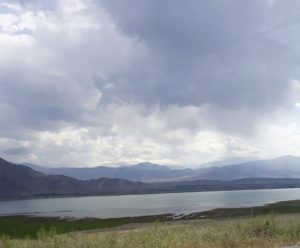
View from campsite
We said “Goodbye” to Mark, the young Dutchman who was parked near us and his sweet little puppy. He had come and asked Dennis’s advice the previous evening on electrical wiring. Having bought a Russian van in Bishkek, he had converted it to a camper. It looked rather dodgy and seeing the wiring protruding from the dashboard, I think he had quite a job on his hands.
When we turned off the main road to the lake last night it had looked like a deserted track. Deceptive. There were houses and gardens hidden among the greenery and one or two of the “shacks” even turned out to be small shops. We stopped at one of these this morning to see if they had any bread. A lady was standing outside the door with a carrier bag. It looked like bread, but they were round, crispy pancakes. They are all round loaves here. The lady gave me one and insisted I try it. I gave it to Dennis while I went in to the shop for a proper loaf, and when I came back, most of it was gone! The pancake was delicious. We must try and find some more!
On the way to Bishkek we climbed two passes at over 3000 metres. Miles of steep hairpins. Ascending the first pass the road was lined with little stalls selling honey. There were banks of hives alongside the tents and yurts. On descending the valley opened out into a wide vista of green. The old way of life as herders seems to persist, with some modern additions. No longer just yurts. Now there are metal caravans of all shapes, colours and sizes. A vehicle of some description is also parked nearby.
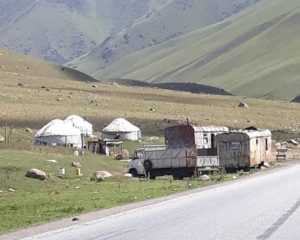
Attempts at beautification have also taken place. White painted stones used to show pathways and garden borders, where plastic flowers bloom! Of course, everyone has a mobile phone.
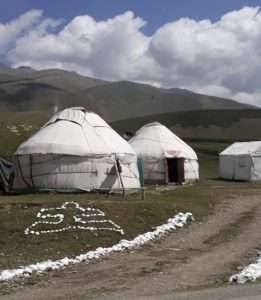
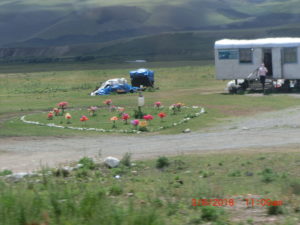
Yurts and caravans are scattered everywhere together with herds of horses. Groups of tiny foals grazing or lying flat out enjoying the sun. Every yurt seems to have a herd of horses nearby. Presumably the family’s wealth is based on the number of horses they possess. There are other animals, sheep, goats and cattle, but it is predominantly horses.
The number of broken down vehicles on the road is astounding. On the second climb we must have passed 6 trucks immobile. There are just as many broken down cars too. Obviously maintenance does not feature highly here. We passed one truck on the wrong side of the road in a ditch and then later a horrible accident where a truck must have lost its brakes and careered across the road taking out another light truck and pushing it into a river. Possible loss of life?
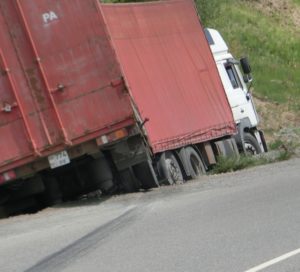
who knows what happened here?
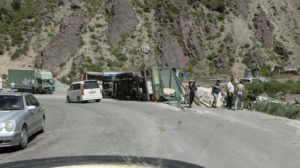
The big one squashed the little one…
Near the top of the second pass we came through a really nasty tunnel. A 2.6 km nightmare of pot holes and pollution. Not to mention drivers who insist on overtaking in the murk. Apparently this was the scene of a carbon-monoxide poisoning in 2001. I could not wait to get out of there. Entering the suburbs of Bishkek was not much better. The road was being upgraded and all traffic was forced onto an unmade up section for many miles. The dust and exhaust fumes were grim.
Bishkek is a big, sprawling city. We thought we would try and get to the Mongolian Consulate before it closed and see if we could get our Mongolian visas. By the time we found it the gates were locked. It’s supposed to be open until 5pm, but on a Friday at 4.50 it was already closed. No surprise really. So, next our hotel. This we found relatively easily and of course it is a hostel, not a hotel. What can one expect for US$22 for a room. It’s just fine.
Views: 38

Your tunnel experience reminds me of the Salang pass in Afghanistan which has a tunnel of similar length complete with potholes, pollution and murk. One of those interesting experiences which tends to stick in the memory.